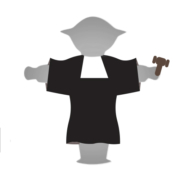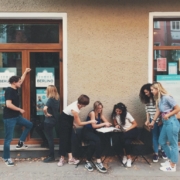A wide range of German courses are starting at Berlino Schule: intensive, evening and conversation classes. Of course it’s also possible to book private and Skype lessons.
Berlino Schule presents its 2017/2018 program of German courses, that is to say from September 2017 to May 2018. There will be many levels and solutions available: morning, afternoon or evening courses, conversation classes (general or specific classes for architects and urban planners), intensive and super-intensive courses. Small groups (14 people maximum), very affordable prices (intensive and super-intensive courses costs just 4€ per hour: it is hard to find a cheaper school with so qualified teachers), school located in the heart of Friedrichshain, one of the most beautiful and at the same time lively districts in Berlin, the core of the city’s vitality. More than 300 students of all ages are attending our recently founded school (established in August 2015), enjoying the broad range of our courses. All teachers are qualified and have acquired years of teaching experience. Are you looking for an accommodation as well? For 2 or 4 weeks? We can help you. We are in contact with several house owners who rent rooms or apartments. Let’s go now straight to the point, talking about dates and costs. Please note that, as for all language schools, one hour consists of 45 minutes.
Read this article in Italian.
INTENSIVE CLASSES: 48 HOURS OF LESSONS OVER 4 WEEKS. PRICE: 192€ (plus 20€ registration fee just for the first time)
Let’s start with the intensive courses, which last 4 weeks for a total of 48 hours of lessons. Each course corresponds to a German level, as defined by CEFR. The courses take place either from Monday to Thursday or from Tuesday to Friday (8:45-11:15 or 11.40-14.10). One “break” day a week is given to strengthen and learn what has been studied during the week, as well as to carry over days lost due to festivities. The price amounts to 192€ + 20€ of registration fee to pay just in case you join a Berlin Schule course in 2017 for the first time (you will also receive the True Italian Card, which entitles students to get discounts in several Italian restaurants and cafés in Berlin). All that just for 4€ per hour. You can hardly find an alternative low cost course with such small groups of students (14). Upon agreement with the school, which will decide case by case, it is possible to enroll in a course even though it has already started, having the possibility to get a discount for the classes you couldn’t join. A certificate of attendance will be issued on demand at the end of every course. If you need to test your level of German before enrolling in the course, it is possible to attend an interview (also via Skype) with one of our teachers. Please CLICK HERE and have a look to our German courses calendar or scroll downwards. For further information, contact us by email: info@berlinoschule.com
EVENING GERMAN CLASSES: 48 HOURS OF LESSON OVER 8 WEEKS. COST: 240€ (plus 20€ registration fee just the first time)
Evening courses are spread over two months time. Lessons take place twice a week. Each lesson lasts 3 hours for a total of 48 hours of lessons. The course costs 240€ + 20€ registration fee if it is the first time you are attending a Berlino Schule course in 2017. By signing up to the course, you will also receive the True Italian Card, which entitles students to get discounts in several Italian restaurants and cafés in Berlin. The courses are either held on Monday and Wednesday or alternatively on Tuesday and Thursday, from 7:15 pm to 9:40 pm. Upon agreement with the school, which will decide case by case, it is possible to enroll in a course even though it has already started, having the possibility to get a discount for the classes you couldn’t join. Please CLICK HERE and have a look to our German courses calendar, or scroll downwards. For further information, contact us by email: info@berlinoschule.com.
GERMAN CONVERSATION CLASSES: 24 HOURS OF LESSON OVER 12 WEEKS. COST: 120€ (plus 20€ registration fee just the first time). MINIMUM LEVEL REQUIRED: B1.
Those working in international environments in Berlin do not always have the possibility to speak German regularly. Every Tuesday from the 5th October 2017 from 7 pm to 8:30 pm, Berlino Schule offers students a conversation course. The lessons are focused on various current topics, regarding the German daily life as well. The students will often discuss about an article taken from a newspaper or a text which will give them the chance to exchange opinions and to improve their vocabulary. They will also have the chance to refresh some grammar rules of the German language that might have been forgotten. The minimum level required to join this course is B1.1. A 12-lesson package costs 120€ + 20€ registration fee if it is the first time you are attending a Berlino Schule course in 2017. By signing up to the course, you will also receive the True Italian Card, which entitles students to get discounts in several Italian restaurants and cafés in Berlin. Please CLICK HERE and have a look to our German courses calendar. For further information, contact us by email: info@berlinoschule.com.
ONE TO ONE LESSONS AND SKYPE LESSONS
We want learning to be accessible to everyone, even if you don’t live in Germany or don’t have the time to come to our school. Our individual and Skype classes are made up for beginners (A1.1) and advanced learners (C1). An attendance certificate will be given to you at the end of your eLearning classes. If you want to take individual classes, no previous knowledge is required. Our flexible schedule will meet your specific linguistic needs and working hours. The attendance will be define with the school.The price is 28 € per hour (45 minutes). For further information, contact us by email: info@berlinoschule.com.
INTENSIVE COURSES CALENDAR (48 HOURS OF LESSONS OVER 4 WEEKS: YEAR 2017
COURSES LISTED PER LEVEL
A1.1
12 SEPTEMBER – 6 OCTOBER (Tue-Fri, 8.45 – 11.15)
10 OCTOBER – 3 NOVEMBER (Tue-Fri, 11.40 – 14.10)
7 NOVEMBER – 1 DECEMBER (Tue-Fri, 8.45 – 11.15)
4 DECEMBER – 22 DECEMBER (Mon-Fri, 11.40 – 14.10)
9 JANUARY – 1 FEBRUARY (Tue-Fri, 8.45 – 11.15)
6 FEBRUARY – 2 MARCH (Tue-Fri, 11.40 – 14.10)
6 MARCH – 30 MARCH (Tue-Fri, 8.45 – 11.15)
3 APRIL – 27 APRIL (Tue-Fri, 11.40 – 14.10)
2 MAY – 25 MAY (Tue-Fri, 8.45 – 11.15)
A1.2
10 OCTOBER – 3 NOVEMBER (Tue-Fri, 8.45 – 11.15)
7 NOVEMBER – 1 DECEMBER (Tue-Fri, 11.40 – 14.10)
4 DECEMBER – 22 DECEMBER (Tue-Fri, 8.45 – 11.15)
9 JANUARY – 1 FEBRUARY (Tue-Fri, 11.40 – 14.10)
6 FEBRUARY – 2 MARCH (Tue-Fri, 8.45 – 11.15)
6 MARCH – 30 MARCH (Tue-Fri, 11.40 – 14.10)
3 APRIL – 27 APRIL (Tue-Fri, 8.45 – 11.15)
2 MAY – 25 MAY (Tue-Fri, 11.40 – 14.10)
A2.1
12 SEPTEMBER – 6 OCTOBER (Tue-Fri, 8.45 – 11.15)
7 NOVEMBER – 1 DECEMBER (Tue-Fri, 8.45 – 11.15)
4 DECEMBER – 22 DECEMBER (Mon-Fri, 11.40 – 14.10)
9 JANUARY – 1 FEBRUARY (Tue-Fri, 8.45 – 11.15)
6 FEBRUARY – 2 MARCH (Tue-Fri, 11.40 – 14.10)
6 MARCH – 30 MARCH (Tue-Fri, 8.45 – 11.15)
3 APRIL – 27 APRIL (Tue-Fri, 11.40 – 14.10)
2 MAY – 25 MAY (Tue-Fri, 8.45 – 11.15)
A2.2
10 OCTOBER – 3 NOVEMBER (Tue-Fri, 8.45 – 11.15)
7 NOVEMBER – 1 DECEMBER (Tue-Fri, 11.40 – 14.10)
4 DECEMBER – 22 DECEMBER (Tue-Fri, 8.45 – 11.15)
9 JANUARY – 1 FEBRUARY (Tue-Fri, 11.40 – 14.10)
6 FEBRUARY – 2 MARCH (Tue-Fri, 8.45 – 11.15)
6 MARCH – 30 MARCH (Tue-Fri, 11.40 – 14.10)
3 APRIL – 27 APRIL (Tue-Fri, 8.45 – 11.15)
2 MAY – 25 MAY (Tue-Fri, 11.40 – 14.10)
B1.1
12 SEPTEMBER – 6 OCTOBER (Tue-Fri, 8.45 – 11.15)
10 OCTOBER – 3 NOVEMBER (Tue-Fri, 11.40 – 14.10)
7 NOVEMBER – 1 DECEMBER (Tue-Fri, 8.45 – 11.15)
4 DECEMBER – 22 DECEMBER (Mon-Fri, 11.40 – 14.10)
9 JANUARY – 1 FEBRUARY (Tue-Fri, 8.45 – 11.15)
6 FEBRUARY – 2 MARCH (Tue-Fri, 11.40 – 14.10)
6 MARCH – 30 MARCH (Tue-Fri, 8.45 – 11.15)
3 APRIL – 27 APRIL (Tue-Fri, 11.40 – 14.10)
2 MAY – 25 MAY (Tue-Fri, 8.45 – 11.15)
B1.2
10 OCTOBER – 3 NOVEMBER (Tue-Fri, 8.45 – 11.15)
7 NOVEMBER – 1 DECEMBER (Tue-Fri, 11.40 – 14.10)
4 DECEMBER – 22 DECEMBER (Tue-Fri, 8.45 – 11.15)
9 JANUARY – 1 FEBRUARY (Tue-Fri, 11.40 – 14.10)
6 FEBRUARY – 2 MARCH (Tue-Fri, 8.45 – 11.15)
6 MARCH – 30 MARCH (Tue-Fri, 11.40 – 14.10)
3 APRIL – 27 APRIL (Tue-Fri, 8.45 – 11.15)
2 MAY – 25 MAY (Tue-Fri, 11.40 – 14.10)
B2.1
7 NOVEMBER – 1 DECEMBER (Tue-Fri, 8.45 – 11.15)
4 DECEMBER – 22 DECEMBER (Mon-Fri, 11.40 – 14.10)
9 JANUARY – 1 FEBRUARY (Tue-Fri, 8.45 – 11.15)
6 FEBRUARY – 2 MARCH (Tue-Fri, 11.40 – 14.10)
6 MARCH – 30 MARCH (Tue-Fri, 8.45 – 11.15)
3 APRIL – 27 APRIL (Tue-Fri, 11.40 – 14.10)
2 MAY – 25 MAY (Tue-Fri, 8.45 – 11.15)
B2.2
10 OCTOBER – 3 NOVEMBER (Tue-Fri, 11.40 – 14.10)
7 NOVEMBER – 1 DECEMBER (Tue-Fri, 11.40 – 14.10)
4 DECEMBER – 22 DECEMBER (Tue-Fri, 8.45 – 11.15)
9 JANUARY – 1 FEBRUARY (Tue-Fri, 11.40 – 14.10)
6 FEBRUARY – 2 MARCH (Tue-Fri, 8.45 – 11.15)
6 MARCH – 30 MARCH (Tue-Fri, 11.40 – 14.10)
3 APRIL – 27 APRIL (Tue-Fri, 8.45 – 11.15)
2 MAY – 25 MAY (Tue-Fri, 11.40 – 14.10)
LEVEL C1 (C1.1 e C1.2)
Please contact us at info@berlinoschule.com
COURSES LISTED PER MONTH
SEPTEMBER
A1.1 12 SEPTEMBER – 6 OCTOBER (Tue-Fri, 8.45 – 11.15)
A2.1 12 SEPTEMBER – 6 OCTOBER (Tue-Fri, 8.45 – 11.15)
B1.1 12 SEPTEMBER – 6 OCTOBER (Tue-Fri, 8.45 – 11.15)
OCTOBER
A1.1 10 OCTOBER – 3 NOVEMBER (Tue-Fri, 11.40 – 14.10)
A1.2 10 OCTOBER – 3 NOVEMBER (Tue-Fri, 8.45 – 11.15)
A2.2 10 OCTOBER – 3 NOVEMBER (Tue-Fri, 8.45 – 11.15)
B1.1 10 OCTOBER – 3 NOVEMBER (Tue-Fri, 11.40 – 14.10)
B1.2 10 OCTOBER – 3 NOVEMBER (Tue-Fri, 11.40 – 14.10)
B2.2 10 OCTOBER – 3 NOVEMBER (Tue-Fri, 11.40 – 14.10)
NOVEMBER
A1.1 7 NOVEMBER – 1 DECEMBER (Tue-Fri, 8.45 – 11.15)
A1.2 7 NOVEMBER – 1 DECEMBER (Tue-Fri, 11.40 – 14.10)
A2.1 7 NOVEMBER – 1 DECEMBER (Tue-Fri, 8.45 – 11.15)
A2.2 7 NOVEMBER – 1 DECEMBER (Tue-Fri, 11.40 – 14.10)
B1.1 7 NOVEMBER – 1 DECEMBER (Tue-Fri, 8.45 – 11.15)
B1.2 7 NOVEMBER – 1 DECEMBER (Tue-Fri, 11.40 – 14.10)
B2.1 7 NOVEMBER – 1 DECEMBER (Tue-Fri, 8.45 – 11.15)
B2.2 7 NOVEMBER – 1 DECEMBER (Tue-Fri, 11.40 – 14.10)
DEZEMBER
A1.1 4 DECEMBER – 22 DECEMBER (Tue-Fri, 11.40 – 14.10)
A1.2 4 DECEMBER – 22 DECEMBER (Tue-Fri, 8.45 – 11.15)
A2.1 4 DECEMBER – 22 DECEMBER (Tue-Fri, 11.40 – 14.10)
A2.2 4 DECEMBER – 22 DECEMBER (Tue-Fri, 8.45 – 11.15)
B1.1 4 DECEMBER – 22 DECEMBER (Tue-Fri, 11.40 – 14.10)
B1.2 4 DECEMBER – 22 DECEMBER (Tue-Fri, 8.45 – 11.15)
B2.1 4 DECEMBER – 22 DECEMBER (Tue-Fri, 11.40 – 14.10)
B2.2 4 DECEMBER – 22 DECEMBER (Tue-Fri, 8.45 – 11.15)
JANUARY
A1.1 9 JANUARY – 1 FEBRUARY (Tue-Fri, 8.45 – 11.15)
A1.2 9 JANUARY – 1 FEBRUARY (Tue-Fri, 11.40 – 14.10)
A2.1 9 JANUARY – 1 FEBRUARY (Tue-Fri, 8.45 – 11.15)
A2.2 99 JANUARY – 1 FEBRUARY (Tue-Fri, 11.40 – 14.10)
B1.1 9 JANUARY – 1 FEBRUARY (Tue-Fri, 8.45 – 11.15)
B1.2 9 JANUARY – 1 FEBRUARY (Tue-Fri, 11.40 – 14.10)
B2.1 9 JANUARY – 1 FEBRUARY (Tue-Fri, 8.45 – 11.15)
B2.2 9 JANUARY – 1 FEBRUARY (Tue-Fri, 11.40 – 14.10)
FEBRUARY
A1.1 6 FEBRUARY – 2 MARCH (Tue-Fri, 11.40 – 14.10)
A1.2 6 FEBRUARY – 2 MARCH (Tue-Fri, 8.45 – 11.15)
A2.1 6 FEBRUARY – 2 MARCH (Tue-Fri, 11.40 – 14.10)
A2.2 6 FEBRUARY – 2 MARCH (Tue-Fri, 8.45 – 11.15)
B1.1 6 FEBRUARY – 2 MARCH (Tue-Fri, 11.40 – 14.10)
B1.2 6 FEBRUARY – 2 MARCH (Tue-Fri, 8.45 – 11.15)
B2.1 6 FEBRUARY – 2 MARCH (Tue-Fri, 11.40 – 14.10)
B2.2 6 FEBRUARY – 2 MARCH (Tue-Fri, 8.45 – 11.15)
MARCH
A1.1 6 MARCH – 30 MARCH (Tue-Fri, 8.45 – 11.15)
A1.2 6 MARCH – 30 MARCH (Tue-Fri, 11.40 – 14.10)
A2.1 6 MARCH – 30 MARCH (Tue-Fri, 8.45 – 11.15)
A2.2 6 MARCH – 30 MARCH (Tue-Fri, 11.40 – 14.10)
A2.2 6 MARCH – 30 MARCH (Tue-Fri, 11.40 – 14.10)
B1.1 6 MARCH – 30 MARCH (Tue-Fri, 8.45 – 11.15)
B1.2 6 MARCH – 30 MARCH (Tue-Fri, 11.40 – 14.10)
B2.1 6 MARCH – 30 MARCH (Tue-Fri, 8.45 – 11.15)
B2.2 6 MARCH – 30 MARCH (Tue-Fri, 11.40 – 14.10)
APRIL
A1.1 3 APRIL – 27 APRIL (Tue-Fri, 11.40 – 14.10)
A1.2 33 APRIL – 27 APRIL (Tue-Fri, 8.45 – 11.15)
A2.1 3 APRIL – 27 APRIL (Tue-Fri, 11.40 – 14.10)
A2.2 3 APRIL – 27 APRIL (Tue-Fri, 8.45 – 11.15)
B1.1 3 APRIL – 27 APRIL (Tue-Fri, 11.40 – 14.10)
B1.2 3 APRIL – 27 APRIL (Tue-Fri, 8.45 – 11.15)
B2.1 3 APRIL – 27 APRIL (Tue-Fri, 11.40 – 14.10)
B2.2 3 APRIL – 27 APRIL (Tue-Fri, 8.45 – 11.15)
MAY
A1.1 2 MAY – 25 MAY (Tue-Fri, 8.45 – 11.15)
A1.2 22 MAY – 25 MAY (Tue-Fri, 11.40 – 14.10)
A2.1 2 MAY – 25 MAY (Tue-Fri, 8.45 – 11.15)
A2.2 2 MAY – 25 MAY (Tue-Fri, 11.40 – 14.10)
B1.1 2 MAY – 25 MAY (Tue-Fri, 8.45 – 11.15)
B1.2 2 MAY – 25 MAY (Tue-Fri, 11.40 – 14.10)
B2.1 2 MAY – 25 MAY (Tue-Fri, 8.45 – 11.15)
B2.2 2 MAY – 25 MAY (Tue-Fri, 11.40 – 14.10)
COURSES LISTED PER SERIES
Series from 12 September (8.45 – 11.15)
A1.1: 12 SEPTEMBER – 6 OCTOBER (Tue-Fri)
A1.2: 10 OCTOBER – 3 NOVEMBER (Tue-Fri)
A2.1: 7 NOVEMBER – 1 DECEMBER (Tue-Fri)
A2.2: 4 DECEMBER – 22 DECEMBER (Mon-Fri)
B1.1: 9 JANUARY – 1 FEBRUARY (Tue-Fri)
B1.2: 6 FEBRUARY – 2 MARCH (Tue-Fri)
B2.1: 6 MARCH – 30 MARCH (Tue-Fri)
B2.2: 3 APRIL – 27 APRIL (Tue-Fri)
Series from 10 October (11.40 –14.10)
A1.1: 10 OCTOBER – 3 NOVEMBER (Tue-Fri)
A1.2: 7 NOVEMBER – 1 DECEMBER (Tue-Fri)
A2.1: 4 DECEMBER – 22 DECEMBER (Mon-Fri)
A2.2: 9 JANUARY – 1 FEBRUARY (Tue-Fri)
B1.1: 6 FEBRUARY – 2 MARCH (Tue-Fri)
B1.2: 6 MARCH – 30 MARCH (Tue-Fri)
B2.1: 3 APRIL – 27 APRIL (Tue-Fri)
B2.2: 2 MAY – 25 MAY (Tue-Fri)
Series from 7 November (8.45 – 11.15)
A1.1: 7 NOVEMBER – 1 DECEMBER (Tue-Fri)
A1.2: 4 DECEMBER – 22 DECEMBER (Mon-Fri)
A2.1: 9 JANUARY – 1 FEBRUARY (Tue-Fri)
A2.2: 6 FEBRUARY – 2 MARCH (Tue-Fri)
B1.1: 6 MARCH – 30 MARCH (Tue-Fri)
B1.2: 3 APRIL – 27 APRIL (Tue-Fri)
B2.1: 2 MAY – 25 MAY (Tue-Fri)
Series from 4 December (11.40 – 14.10)
A1.1: 4 DECEMBER – 22 DECEMBER (Mon-Fri)
A1.2: 9 JANUARY – 1 FEBRUARY (Tue-Fri)
A2.1: 6 FEBRUARY – 2 MARCH (Tue-Fri)
A2.2: 6 MARCH – 30 MARCH (Tue-Fri)
B1.1: 3 APRIL – 27 APRIL (Tue-Fri)
B1.2: 2 MAY – 25 MAY (Tue-Fri)
Series from 9 January (8.45 – 11.15)
A1.1: 9 JANUARY – 1 FEBRUARY (Tue-Fri)
A1.2: 6 FEBRUARY – 2 MARCH (Tue-Fri)
A2.1: 6 MARCH – 30 MARCH (Tue-Fri)
A2.2: 3 APRIL – 27 APRIL (Tue-Fri)
B1.1: 2 MAY – 25 MAY (Tue-Fri)
Series from 6 February (11.40 – 14.10)
A1.1: 6 FEBRUARY – 2 MARCH (Tue-Fri)
A1.2: 6 MARCH – 30 MARCH (Tue-Fri)
A2.1: 3 APRIL – 27 APRIL (Tue-Fri)
A2.2: 2 MAY – 25 MAY (Tue-Fri)
Series from 6 March (8.45 – 11.15)
A1.1: 6 MARCH – 30 MARCH (Tue-Fri)
A1.2: 3 APRIL – 27 APRIL (Tue-Fri)
A2.1: 2 MAY – 25 MAY (Tue-Fri)
Series from 3 April (11.40 – 14.10)
A1.1: 3 APRIL – 27 APRIL (Tue-Fri)
A1.2: 2 MAY – 25 MAY (Tue-Fri)
Series from 2 May (8.45 – 11.15)
A1.1: 2 MAY – 25 MAY (Tue-Fri)
GERMAN EVENING CLASSES CALENDER (48 HOURS OF LESSON OVER 8 WEEKS)
COURSES LISTED PER LEVEL
A1.1
11 SEPTEMBER – 1 NOVEMBER (Mon and Wed, 19.15-21.40)
7 NOVEMBER – 11 JANUARY (Tue and Thu, 19.15-21.40)
15 JANUARY – 7 MARCH (Mon and Wed, 19.15-21.40)
13 MARCH – 3 MAY (Tue and Thu, 19.15-21.40)
7 MAY – 27 JUNE (Mon and Wed, 19.15-21.40)
A1.2
6 NOVEMBER – 10 JANUARY (Mon and Wed, 19.15-21.40)
16 JANUARY – 8 MARCH (Tue and Thu, 19.15-21.40)
12 MARCH – 2 MAY (Mon and Wed, 19.15-21.40)
8 MAY – 28 JUNE (Tue and Thu, 19.15-21.40)
A2.1
11 SEPTEMBER – 1 NOVEMBER (Mon and Wed, 19.15-21.40)
15 JANUARY – 7 MARCH (Mon and Wed, 19.15-21.40)
13 MARCH – 3 MAY (Tue and Thu, 19.15-21.40)
7 MAY – 27 JUNE (Mon and Wed, 19.15-21.40)
A2.2
6 NOVEMBER – 10 JANUARY (Mon and Wed, 19.15-21.40)
12 MARCH – 2 MAY (Mon and Wed, 19.15-21.40)
8 MAY – 28 JUNE (Tue and Thu, 19.15-21.40)
B1.1
6 NOVEMBER – 10 JANUARY (Mon and Wed, 19.15-21.40)
16 JANAUARY – 8 MARCH (Tue and Thu, 19.15-21.40)
12 MARCH – 2 MAY (Mon and Wed, 19.15-21.40)
8 MAY – 28 JUNE (Tue and Thu, 19.15-21.40)
B1.2
7 NOVEMBER – 11 JANUARY (Tue and Thu, 19.15-21.40)
15 JANUARY – 7 MARCH (Mon and Wed, 19.15-21.40)
13 MARCH – 3 MAY (Tue and Thu, 19.15-21.40)
7 MAY – 27 JUNE (Mon and Wed, 19.15-21.40)
B2.1
6 NOVEMBER – 10 JANUARY (Mon and Wed, 19.15-21.40)
16 JANAUARY – 8 MARCH (Tue and Thu, 19.15-21.40)
12 MARCH – 2 MAY (Mon and Wed, 19.15-21.40)
8 MAY – 28 JUNE (Tue and Thu, 19.15-21.40)
B2.2
7 NOVEMBER – 11 JANUARY (Tue and Thu, 19.15-21.40)
15 JANUARY – 7 MARCH (Mon and Wed, 19.15-21.40)
13 MARCH – 3 MAY (Tue and Thu, 19.15-21.40)
7 MAY – 27 JUNE (Mon and Wed, 19.15-21.40)
COURSES LISTED PER SERIES
Series from 11th September (Mon and Wed, 19.15-21.40)
A1.1: 11 SEPTEMBER – 1 NOVEMBER
A1.2: 6 NOVEMBER – 10 JANUARY
A2.1: 15 JANUARY – 7 MARCH
A2.2: 12 MARCH – 2 MAY
B1.1: 7 MAY – 27 JUNE
Series from 7th November (Tue and Thu, 19.15-21.40)
A1.1: 7 NOVEMBER – 11 JANUARY
A1.2: 16 JANUARY – 8 MARCH
A2.1: 13 MARCH – 3 MAY
A2.2: 8 MAY – 28 JUNE
Series from 15th January (Mon and Wed, 19.15-21.40)
A1.1: 15 JANAURY – 7 MARCH
A1.2: 12 MARCH – 2 MAY
A2.1: 7 MAY – 27 JUNE
Series from 13th November (Tue and Thu, 19.15-21.40)
A1.1: 13 MARCH – 3 MAY
A1.2: 8 MAY – 28 JUNE
Series from 7th May (Mon and Wed, 19.15-21.40)
A1.1: 7 MAY – 27 JUNE
GERMAN CONVERSATION CLASSES: 24 HOURS OF LESSON OVER 12 WEEKS. MINIMUM LEVEL REQUIRED: B1
Every Thursday from the 5th October from 7 PM to 8:30 PM
Series of 12 lessons (2 hours per lesson)
For further information, contact us by email: info@berlinoschule.com







